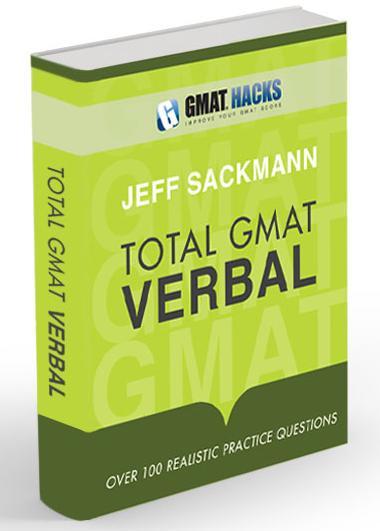
Bookshelf
|
|
Total GMAT Math Jeff's complete Quant guide, on sale now! |
|
|
Total GMAT Verbal Everything you need to ace GMAT Verbal! |
1,800 Practice Math Questions
Buy Jeff's books at Amazon.com

GMAT Official Guide, with IR
OG Math | OG Verbal
OG12 & Quant Rev solutions!
GMAT Question of the Day
Beginner's Guide to the GMAT
GMAT Hacks Affiliate Program

Recent Hacks

Categories
- General Study Tips
- Goals and Planning
- CAT Strategy
- The Mental Game
- GMAT Math Strategy
- GMAT Math Topics
- Mental Math
- Data Sufficiency
- Critical Reasoning
- Reading Comprehension
- Sentence Correction
- Analytical Writing Assessment
- Integrated Reasoning
- IR Explained
- Business School Admissions
- GMAT Prep Resources
- Practice Questions
- Total GMAT Math
- Total GMAT Verbal
- GMAT 111

GMAT Test Prep Briefing
| You should follow me on Twitter. While you're at it, take a moment to subscribe to GMAT Hacks via RSS or Email. |
Yesterday in New York City, I attended the GMAT Test Prep Briefing hosted by the folks from GMAC. They hold events like this once every two years to keep test-prep providers up to speed on changes in the test.
It was a worthwhile exercise, at least for people like me. For you though, there's not much to share.
Slight Changes In the GMAT Question Pool
The test has changed little, if at all, in the last two years. The only things you might notice are that the quality of the question pool has increased, and the vendor that writes the questions for GMAC has changed. That means that some questions in the Official Guides and in the GMATprep software may not be as representative of the actual GMAT as they were, say, two or three years ago.
But there's not much you can do about that. GMAC is planning on releasing a new diagnostic tool in the first quarter of 2008 and a new edition of the Official Guides in the fourth quarter of 2008. For the vast majority of you, preparing for the GMAT in the near future, that's all but worthless.
Strategy Reinforcement
I've written about it many times before: the GMAT CAT algorithm is such that you should not spend more time on the first 10 questions. That's an open secret by this point, but rumors to the contrary persist.
The head psychometrician from GMAC spoke yesterday, and made it a point to dispel those rumors one more time.
Further, he elaborated on the penalty structure for not finishing a section. In the model he displayed, a test-taker who is getting a 70th percentile score but doesn't answer the last five questions is penalized all the way down to a 55th percentile score. Ouch.
Takeaway: time management is everything. I think you've read that somewhere before.
Other Tidbits
I was a bit surprised to learn that the algorithm in the GMATprep CATs is identical to the algorithm in the actual test, and that the question pool, if anything, is slightly larger in the GMATprep CATs. That means those GMATprep CATs are, with the exception of outdated questions, about as realistic as you can possibly get.
There are a few other things I'll share in the coming weeks, specifically about how success on the GMAT correlates to study time, in hours and in weeks, and how people do when they retake the test. Much of this information is available publicly on the GMAC website, but it's a lot easier to let me slog through it than to do so yourself.
About the author: Jeff Sackmann has written many GMAT preparation books, including the popular Total GMAT Math, Total GMAT Verbal, and GMAT 111. He has also created explanations for problems in The Official Guide, as well as 1,800 practice GMAT math questions.
 |
Total GMAT Verbal
The comprehensive guide to the GMAT Verbal section. Recognize, dissect, and master every question type
you'll face on the test. Everything you need, all in one place, including 100+ realistic practice questions. |